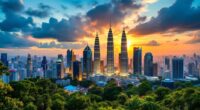Malaysia is experiencing a significant boom in data centers, driven by major tech companies like Google, Amazon, and Alibaba. This surge is creating thousands of jobs but also raising concerns about the environmental impact and resource availability in the region.
Key Takeaways
- Job Creation: Approximately 40,000 jobs have been generated in Malaysia's data center sector.
- Rapid Growth: Johor has seen a 100-fold increase in data center capacity over the past five years.
- Environmental Concerns: Increased demand for electricity and water raises sustainability issues.
The Data Center Boom
In recent years, Malaysia has emerged as a key player in the data center industry, particularly in the southern state of Johor, which borders Singapore. The region has attracted around 50 data center projects, significantly increasing its capacity to meet the growing demand for cloud computing and artificial intelligence services.
The data center sector is not only transforming the local economy but also providing lucrative job opportunities. For instance, Granill Ding Simon, a mechanical engineer, reported that his new role in a data center pays double his previous salary in the railway sector.
Economic Impact
The digital economy in Malaysia employed over 1.2 million people last year and contributed about 25% to the nation's GDP. With the AI boom projected to add nearly $1 trillion to Southeast Asia's GDP by 2030, Malaysia is well-positioned to capitalize on this growth.
The influx of investments into Johor has been further fueled by Singapore's temporary moratorium on data center expansions, which has redirected projects to Malaysia. This has resulted in an estimated $3.8 billion in investments in Johor's data centers this year alone.
Resource Concerns
Despite the economic benefits, the rapid expansion of data centers has raised alarms about resource availability. Residents like Amir Alif have reported increased power outages and water disruptions, highlighting the strain on local infrastructure.
The National Water Services Commission has warned that Malaysia could face widespread water shortages in the next five years, exacerbated by climate change and aging infrastructure. Additionally, electricity demand from data centers is projected to exceed 5,000 MW by 2035, which could account for nearly 20% of Peninsular Malaysia's installed capacity.
Government Response
Local authorities are aware of these challenges. Johor Bahru's mayor, Mohd Noorazam Osman, expressed concerns about the sustainability of water and power resources amidst the data center boom. In response, the Johor state government plans to implement sustainability guidelines for new data center developments, focusing on power and water efficiency.
Prime Minister Anwar Ibrahim has also emphasized the need for data centers to adopt sustainable practices, stating that reliance on cheap energy and water is no longer viable. New planning guidelines have been approved to ensure that domestic resource needs are prioritized.
Future Prospects
While Johor remains a hotspot for data center investments, other regions in Malaysia are also being developed for this purpose. Amazon Web Services is establishing a data center in Cyberjaya, while Google is setting up in Selangor.
As the industry continues to grow, aspiring workers like Isaac Matthews are considering opportunities in Johor, viewing it as a promising career destination in the burgeoning data center sector.

